From Anse à la Baie to à Anse à l'Eau
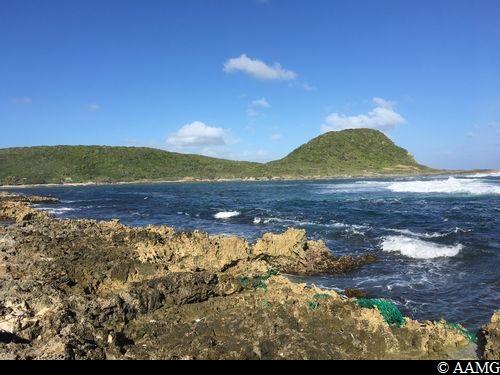
Saint-Francois Coastal trail
Coastal trail
From Anse à la Baie to à Anse à l'Eau
Very easy
3h
4,7km
+38m
-37m
Cross
PR (short hike network)
Embed this item to access it offline
The trail features heat, sea, landscapes and fine sand.
9 points of interest
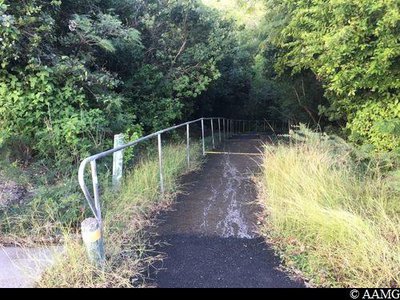
AAMG  History
Historysteps towards the Plage de la Baie
It is customary to come here on January 1 to take a "bain démarré" (starting bath) in the Bay. The tradition is a way to clean the body (using leaves) of everything that is bad in us in order to get the new year off to a good start.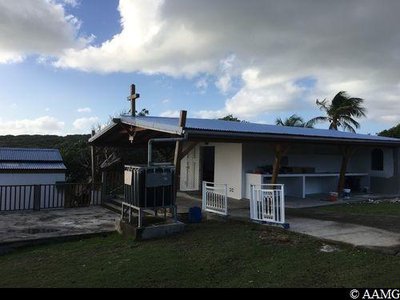
AAMG  Cultural and architectural heritage
Cultural and architectural heritagethe chapel
The chapel is dedicated to the Virgin Mary. Legend has it that she has given her blessing to visitors. It is a site of prayer and pilgrimage that is often still visited by the local Christian community.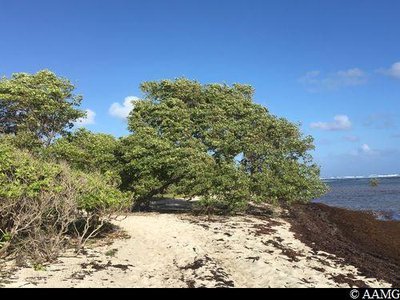
Palétuvier Gris - AAMG  Flora
FloraGreen buttonwood
Here you can see a magnificent green buttonwood plant, Conocarpus erecta. The buttonwood grows on sandy and dry soil. It can hold loose soil together and stabilise the sand. Its wood was once used to make railway sleepers. It has antimicrobial properties.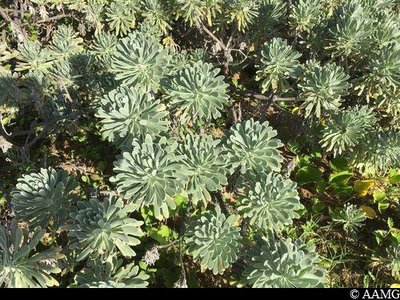
Ramarin blanc - AAMG  Flora
FloraSea lavender
Sea lavender, Argusia gnafolodes, is a small shrub living along the dry and windswept coast.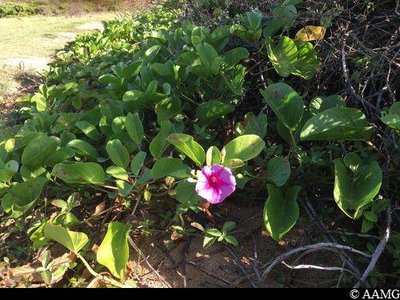
AAMG  Flora
FloraBayhops
Bayhops, Ipomea pes-capreae, can be recognised with their big purple flowers shaped like a cone. It is a climbing plant living on sandy soils. In traditional medicine, it is used to treat oedema and boils. The root is thought to cure diarrhoea.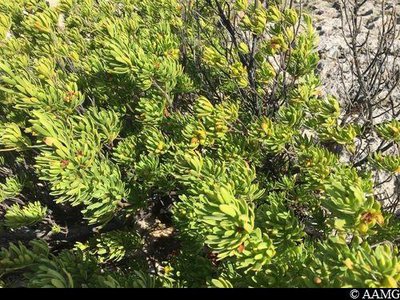
Romarin noir - admin  Flora
FloraBay cedar
Bay cedar, Suriana maritima, lives in the same place as sea lavender. It has darker leaves. It has no medicinal properties locally to our knowledge.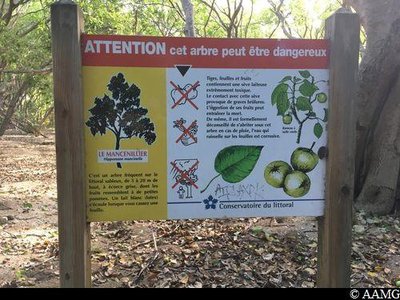
AAMG  Flora
FloraManchineel tree wood
The trail winds its way through a small manchineel tree wood (Hippomane Mancinella), which means "little apple".
Be careful, the sap is toxic and flows like a milky fluid (latex). It causes serious burns. Its fruits are like small, round and shiny apples, but are very poisonous, too. Whatever you do, don't eat them.
Legend has it that native Americans daubed their arrows and other weapons with it. The aim was to prevent their enemies' wounds from healing.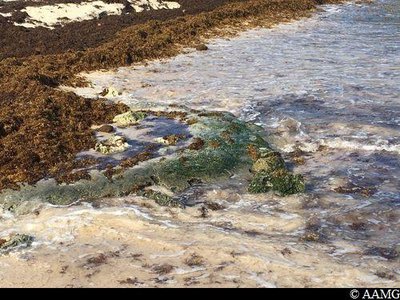
AAMG  Cultural and architectural heritage
Cultural and architectural heritageFreshwater spring
Here, linked to the sea, is a freshwater spring emerging through a crack in the limestone. A parapet has been built to separate the freshwater from the sea water. But the sea regularly deposits sand on the site. The site shows the importance freshwater has always had in northern Grande-Terre for people and animals. There are no rivers in the region. Survival is only possible because of the ponds and wells with access to the groundwater table.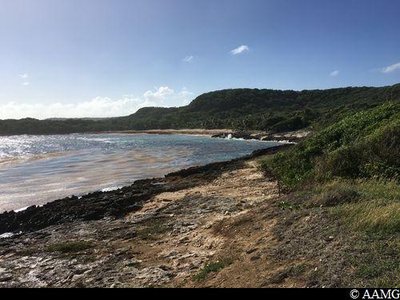
vue sur Anse à l'Eau - AAMG  Viewpoint
ViewpointView over Anse à L'Eau
Here you will see a bench where you can take a seat and round off the hike with a view over all the Bay.
Description
At the car park, go down the stone steps with the guardrail to the bay.
When you have your feet in the sand, head to the left to take the very steep steps up to the chapel.
At the chapel, turn right into the undergrowth. There is a gentle slope down to the coast.
Walk alongside the coast between the thickets, on the dirt track and the sand.
Just before arriving at Anse à l'Eau the trail enters a manchineel wood.
The end of the trail is at the other side of the beach, near a bench looking out to sea.
You can continue the path to the town of Le Moule, if you're feeling energetic (see "Moule coastal trail").
When you have your feet in the sand, head to the left to take the very steep steps up to the chapel.
At the chapel, turn right into the undergrowth. There is a gentle slope down to the coast.
Walk alongside the coast between the thickets, on the dirt track and the sand.
Just before arriving at Anse à l'Eau the trail enters a manchineel wood.
The end of the trail is at the other side of the beach, near a bench looking out to sea.
You can continue the path to the town of Le Moule, if you're feeling energetic (see "Moule coastal trail").
- Departure : Anse à la Baie (Baie Olive), Saint-François.
- Arrival : Anse à l'Eau, Saint-François.
- Towns crossed : Saint-Francois
Altimetric profile
Recommandations
NB: this is a non-circular trail, so you should leave a car at the end of the trail (in L'Anse à l'Eau).
Don't forget to take a hat and suncream, because there is very little shade on this trail.
Please note, the yellow markings are quite sparse, but you can't get lost. You walk along the coast all the way.
In this natural setting, you should be particularly careful and alert, since Guadeloupe is subject to natural risks. It is vital to act in a responsible way, so that everyone can enjoy the hike!
Please note: unsupervised car parks and swimming.
Don't forget to take a hat and suncream, because there is very little shade on this trail.
Please note, the yellow markings are quite sparse, but you can't get lost. You walk along the coast all the way.
In this natural setting, you should be particularly careful and alert, since Guadeloupe is subject to natural risks. It is vital to act in a responsible way, so that everyone can enjoy the hike!
Please note: unsupervised car parks and swimming.
Information desks
avenue de l'Europe, 97118 Saint-François
Access and parking
GPS starting point: Lat: 16,27762° N - Long: 61,24831° W.
---
In the municipality of Saint-François and towards Pointe des Châteaux. Take the D118 road. Just after the golf course, in the bend in the road, turn left towards "Plantation St Marthe". At the top of the hill, turn right onto Le Chemin de Croix and continue for about 3 kilometres. You have arrived when you get to the turnaround point.
---
In the municipality of Saint-François and towards Pointe des Châteaux. Take the D118 road. Just after the golf course, in the bend in the road, turn left towards "Plantation St Marthe". At the top of the hill, turn right onto Le Chemin de Croix and continue for about 3 kilometres. You have arrived when you get to the turnaround point.
Parking :
Start: Anse à la Baie. Finish: Anse à l'Eau.
Source
Rando Guadeloupehttps://www.randoguadeloupe.gp/
Report a problem or an error
If you have found an error on this page or if you have noticed any problems during your hike, please report them to us here:

